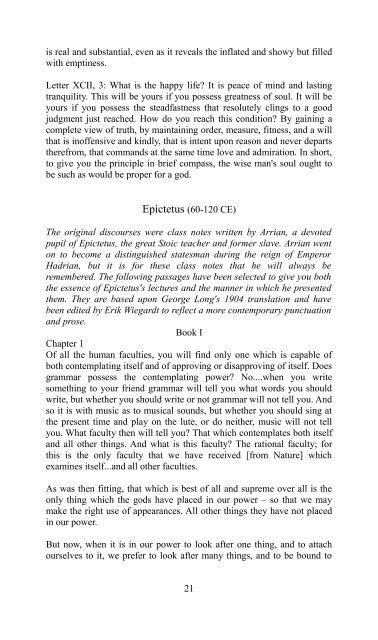The Stoic HANDBOOK - College of Stoic Philosophers
The Stoic HANDBOOK - College of Stoic Philosophers
The Stoic HANDBOOK - College of Stoic Philosophers
You also want an ePaper? Increase the reach of your titles
YUMPU automatically turns print PDFs into web optimized ePapers that Google loves.
is real and substantial, even as it reveals the inflated and showy but filled<br />
with emptiness.<br />
Letter XCII, 3: What is the happy life? It is peace <strong>of</strong> mind and lasting<br />
tranquility. This will be yours if you possess greatness <strong>of</strong> soul. It will be<br />
yours if you possess the steadfastness that resolutely clings to a good<br />
judgment just reached. How do you reach this condition? By gaining a<br />
complete view <strong>of</strong> truth, by maintaining order, measure, fitness, and a will<br />
that is in<strong>of</strong>fensive and kindly, that is intent upon reason and never departs<br />
therefrom, that commands at the same time love and admiration. In short,<br />
to give you the principle in brief compass, the wise man's soul ought to<br />
be such as would be proper for a god.<br />
Epictetus (60-120 CE)<br />
<strong>The</strong> original discourses were class notes written by Arrian, a devoted<br />
pupil <strong>of</strong> Epictetus, the great <strong>Stoic</strong> teacher and former slave. Arrian went<br />
on to become a distinguished statesman during the reign <strong>of</strong> Emperor<br />
Hadrian, but it is for these class notes that he will always be<br />
remembered. <strong>The</strong> following passages have been selected to give you both<br />
the essence <strong>of</strong> Epictetus's lectures and the manner in which he presented<br />
them. <strong>The</strong>y are based upon George Long's 1904 translation and have<br />
been edited by Erik Wiegardt to reflect a more contemporary punctuation<br />
and prose.<br />
Book I<br />
Chapter 1<br />
Of all the human faculties, you will find only one which is capable <strong>of</strong><br />
both contemplating itself and <strong>of</strong> approving or disapproving <strong>of</strong> itself. Does<br />
grammar possess the contemplating power? No....when you write<br />
something to your friend grammar will tell you what words you should<br />
write, but whether you should write or not grammar will not tell you. And<br />
so it is with music as to musical sounds, but whether you should sing at<br />
the present time and play on the lute, or do neither, music will not tell<br />
you. What faculty then will tell you? That which contemplates both itself<br />
and all other things. And what is this faculty? <strong>The</strong> rational faculty; for<br />
this is the only faculty that we have received [from Nature] which<br />
examines itself...and all other faculties.<br />
As was then fitting, that which is best <strong>of</strong> all and supreme over all is the<br />
only thing which the gods have placed in our power – so that we may<br />
make the right use <strong>of</strong> appearances. All other things they have not placed<br />
in our power.<br />
But now, when it is in our power to look after one thing, and to attach<br />
ourselves to it, we prefer to look after many things, and to be bound to<br />
21

















